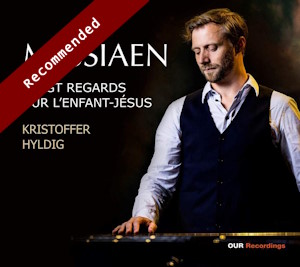
Olivier Messiaen (1908-1992)
Vingt Regards sur l’Enfant Jésus (1944)
Kristoffer Hyldig (piano)
rec. 2021, Vor Frelser’s Church, Copenhagen
OUR Recordings 6.220677/78 SACD [2 discs: 138]
Olivier Messiaen composed his Vingt regards sur l’Enfant-Jésus in Paris between March-September 1944, he was thirty-six years old and the city was in the process of liberation. It’s a suite of 20 pieces for solo piano, each a meditation on the infant Jesus. The composer dedicated the work to his pupil Yvonne Loriod, who would later become his wife. She made two recordings of it, inscriptions that carry a particular authority.
Vingt regards expresses the composer’s deeply rooted Catholic faith, yet you don’t have to be a believer to fully appreciate the work’s outstanding musical worth. Over the years it has taken on an iconic status, mentioned in the same breath as Bach’s Well-Tempered Clavier and Beethoven’s 32 Piano Sonatas in terms of its stature and scale. The fruit of intellectual vigour, it’s a ground-breaking composition, brimming with potency and energy, and suffused with an abundance of radiant sonorities.
The work has been frequently recorded, and MusicWeb has featured several reviews in its pages. This latest version by Danish pianist Kristoffer Hyldig faces some stiff competition. Aside from Loriod’s versions, top of the list for me include that by Roger Muraro’s, which I had the pleasure of reviewing back in 2016 and the live recording made by Jean-Rodolphe Kars, given a glowing review by John Quinn, who awarded it a Recording of the Month. I bought this recording on the basis of John’s review. Yet, others will have their favorites. Those by Steven Osborne and Bertrand Chamayou have garnered very positive write-ups, but neither version I’ve heard.
There’s so much to commend in Hyldig’s performance, I’ll focus on some of the highlights. The cycle opens with Régard du Père, a piece both mesmerizing and hypnotic. Hyldig exercises wonderful dynamic control, fully capturing the mystery of the scene. What follows is Régard de l’étoile, a piece of utter contrasts, passionate declamations alternating with moments of serene contemplation. Hyldig’s hypnotiic Regard de la Vierge, which begins with a tender and intimate lullaby, is awash with an array of tonal hues. These luminous sonorites carry forward into Regard du Fils sur le Fils, a static piece suffused with glistening tendrils of light. The toccata-like and angular Par Lui tout a eté fait impacts the listener with tectonic ructions, as does Regard de l’Onction terrible, located towards the end of the cycle.
Exuberance and cascade characterize the virtuosic Régard de l’Esprit de joie. Hyldig brings to it authority and panache. How different it is to the dreamy and contemplative Regard du Silence, or the penultimate Je dors, mais mon coeur veille, which is played with a death-like stillness. The pianist unleashes the unrelenting and seismic power of La parole toute-puissante with red-blooded bombast. The cycle culminates with Regard de l’Église d’amour, a piece of grandeur and solemnity with a hint of menace thrown in for good measure. Hyldig calls time on Messiaen’s magnificent score with coruscating phantasmagoria.
This is an outstanding traversal of Messiaen’s searing, large scale masterpiece. There’s certainly much to admire. The Vor Frelser’s Church, Copenhagen is an ideal venue to facilitate clarity of textures and just the right amount of resonance to allow the exquisite harmonies and manifold colours to register with maximum effect. I enjoyed reading the pianist’s personal reflections on the score; obviously he has a great love for it, and that comes over in the commitment and musical vision he brings to the performance. His glowing account of this iconic score stands shoulder to shoulder with the very best versions in the catalogue.
Stephen Greenbank
Help us financially by purchasing from





















